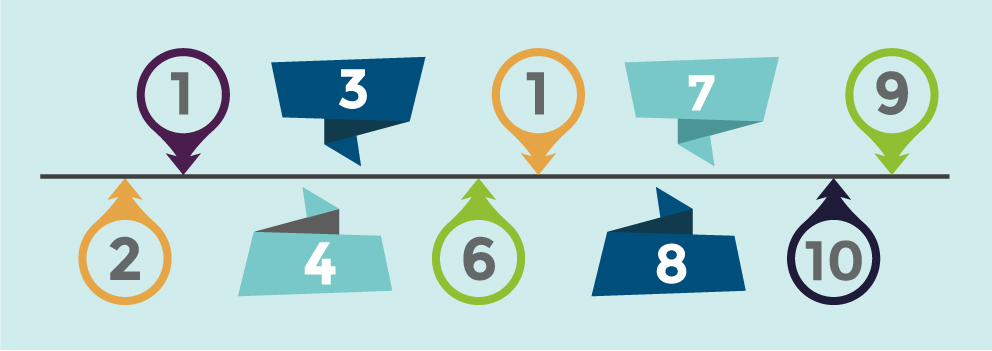Careers advice and information for the South
Top 10 things not to do in a job interview

We've been asking local employers for tips on what to do in an interview – and, of course, what not to do! Here are our top 10 not to do in that all-important job interview.
1. Don't go in unprepared
No matter how busy you are in the run up to the interview, don't cut corners on your research. It's vital that you go into any interview with as much knowledge as possible about the company, your employer and your potential new role. It will be obvious to the interviewer if you're badly prepared, so make full use of the internet and social networks such as LinkedIn well in advance, and know exactly who you're dealing with. Take time to assess the industry, too, so you're fully aware of the competition and where your company stands in its market.
2. Don't be late
There are no two ways about it: if you're late, unless you've rearranged this in advance, you're putting yourself at a disadvantage before you begin. Leave bags of time. Equally, if you're hours early, don't spend all of that time sat waiting in the company's reception...
3. Don't go casual
Even in a relaxed company, the interview is the time to make an excellent first impression. Professional attire is the normal dress code, or if it's the kind of interview where a suit would look odd, ensure you're extremely well-presented. That goes for the materials you take with you, too – prepare extra copies of your CV and references, and make sure any folders are smart – leave that One Direction stationery at home.
4. Don't give the wrong impression
Avoiding eye contact, slumping or having a weak, sweaty handshake are all big no-nos. It's common sense, really – you need to strike the interviewer as confident and capable, so walk tall, greet the interviewer with a smile and a firm (but not crushing) handshake, meet their eyes and sit in a positive stance, without fidgeting. If you're prone to nerves, take a few deep breaths before you go in, and talk yourself into a more comfortable state of mind (not out loud).
5. Don't be negative
Normally, it's good to tell the truth. But if the truth is that you're looking for a new job because you hate everyone in your current employment and the mere sight of your boss makes you want to harm someone, keep it to yourself. Even if you have justified grounds for thinking the management needs a restructure, or you want to emphasise the difference between your old company and the new one, being negative is a surefire way to turn your interviewer off. Focus on the positives, and continue to make a winning impression.
6. Don't rush
Think before you speak. It's preferable to admit that you need time on a question, or that you don't know something, rather than rambling off at a tangent or trying to 'blag' an answer and coming across as vague or cliched. You probably do have a great answer, the key thing is to arrive at it in a calm, measured fashion! Equally, if you know you're likely to freeze, practise some standard answers beforehand, so you have a framework to fall back on if you struggle to think under pressure.
7. Don't be caught out by your own CV
Know that CV like the back of your hand, and be prepared to answer questions on all aspects of it. If there is something you know you won't want to dwell on, like any gaps, or jobs you're not proud of, think about how you can turn things into positives so you won't be daunted or flustered if they do come up.
8. Don't treat it like a social occasion
No matter how confident you feel about your interview success, don't slip into an unprofessional, over-friendly, or – heaven forbid – flirty, tone. Remember why you're there, and don't presume that you'll be the chosen candidate. Concentrate on demonstrating that you'll be an asset to the company. It's also important not to overshare. The interviewer may have to see several people in a row and they won't have time to hear your entire life story. It's not the X-Factor, after all…
9. Don't take a back seat
No-one wants to employ a wet lettuce. If you're qualified for the job and you're interested in the job, show it by getting involved in the interview. Plan intelligent questions in advance and remember that it should be a two-way process – be inquisitive about the role that you're trying to get. You should be paying attention to everything the interviewer says and reacting to it, so it's very much a dialogue, rather than a monologue from either side.
10. Don't relax (too much)
Some employers recommend ending the interview by telling the interviewer how much you want the job and concluding that you think you would be a good fit – it may give them the opportunity to give you some insight as to their thought process, too. Either way, once it's over, don't relax. It's become normal to follow up with a brief email, thanking the interviewer for their time and reiterating your interest in the role. It shows you really want it. Just don't make it a begging letter
Please share this article with your friends on Facebook - thank you.
Much of the advice on our website has been kindly provided by local companies and organisations for which we are very grateful - could you offer some advice to our visitors in return for some free coverage on our website? If so please get in touch here as we'd love to hear from you.
Careers Advice
We work with experts in and around our local area to provide useful information relating to careers advice - we hope you will find these articles to be helpful. You can view our news news archive here

Dealing with Redundancy - Part 5 - Finding a New Job
Once your redundancy is dealt with and any retraining has been undertaken you will probably need to find a new job. This can seem daunting, particularly if you have not had to look for a new
read more
Redundancy - Advice for Employers and Businesses
When we hear the word 'redundancy' it is natural to think of the impact that it will have on the person being made redundant with out regard for the difficulties inflicted upon the employer
read more
Dealing with Redundancy - Part 2 - Financial Advice
Do you know the tax implications of receiving a redundancy package and how to avoid paying unnecessary tax? If you are going to find yourself struggling financially do you know how to lessen
read more
Dealing with Redundancy - Part 1 - Knowing Your Rights
Do you know what redundancy package you are likely to receive? Do you know what the government stipulated minimum package is? As well as detailing the legal and financial aspects we will
read more
Dealing with Redundancy - Part 3 - Psychological Impact
Do you feel like you’ve lost your identity and can’t stop feeling negative? It is not only the practicalities of redundancy that need to be addressed. Redundancy can also have a massive
read more
Top 10 things not to do in a job interview
We've been asking local employers for tips on what to do in an interview – and, of course, what not to do! Here are our top 10 not to do in that all-important job interview.
read more
Dealing with Redundancy - Part 4 - Retraining and Development
Have you thought about a new career or improving upon the skills you currently have? In this article we will offers tips and advice on increasing your 'employability' through courses and
read more
10 Steps to Creating Career Opportunities
It's too easy to start looking in the job section of the paper and applying for everything that has an attractive salary, car or any other perks, before falling into this trap, be really
read morethe South Employment & Business News
When attending interviews it's always good to be up to date with what's happening in the local business and employment sector - we hope you'll find these selected news articles interesting
Part time Jobs in townname
It can appear challenging to find a job that fits in with your life commitments. We are aware that 9 to 5 from Monday to Friday does not suit everyone. In fact, statistics demonstrate that the number of employees working over 45 hours a week is in decline. It is not unusual for people to desire hours which fit around personal factors including childcare. If you’re looking for a part time job in townname what are some common sectors to find flexible hours and how can sitename assist you in finding a part time job in townname? Common Part Time Jobs in Townname Part time jobs in townname are available in all sectors but experience has shown that certain sectors commonly have a greater number of flexible openings than others, especially when you require a part time job with little experience needed. Here are some sectors that we recommend you make your first port of call: Customer Services It is not uncommon for ..read more
Nursing jobs in the South
Nursing and care is one of the major industries in the South with several hospitals and many care homes and care establishments in this area. All of these establishments need staffing but how can you go about looking for the ..read more
What not to do in your the South job interview
As well as preparing for what you should do when attending a job interview, whether it's a part time job in the South or that exciting next step on the career ladder, it is just as ..read more
Top 4 questions asked at job interviews for the South job seekers
1. Describe your strengths It is pretty much a sure fire thing that on most the South job interviews you will be asked what you think your areas of strength are (and sometimes what you think your ..read more
Interview Tips to help you get that perfect job in the South
AllRegionalJobs is specifically designed to assist people find jobs in the South or to find jobs in the area of the South. With the careers market now more ..read more
The Recruitment Process to Fill your the South Job
How can you find the right the South job for you?
What is different about looking for jobs today in the South compared to 10 years ago
Covering Letter hints and tips for when applying for jobs in the South
Looking for a second job in the South?
The various Universities in The South of England
Public Sector jobs in the South
Information on local newspapers covering the South
Example CV for people applying for jobs in the South